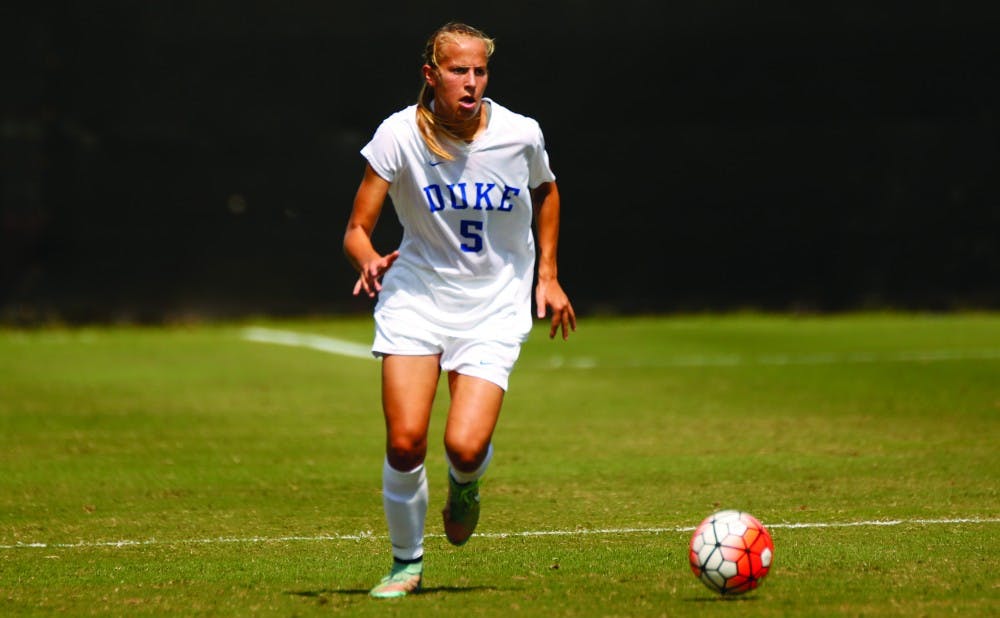Every time you boot up Madden or FIFA on your video game console, a familiar slogan blurts out: "EA Sports: It's in the game."
Rebecca Quinn was going to bring literal meaning to that motto—until the NCAA put its foot down.
Quinn, a junior defender for the Blue Devils who played for Team Canada at this summer's Pan American Games, was slated to appear in FIFA 16, the latest installment of the popular soccer video game that was officially released Tuesday. But EA Sports announced Thursday that it would remove Quinn's avatar—and the virtual representations of 12 other players—after the NCAA informed the game's creator that the players could be risking their collegiate eligibility.
Back on the field for Duke, Quinn said that she had heard discussions of NCAA rulings leading up to the decision, but that her status in the game was uncertain until the final ruling came Thursday.
"To be honest, I play a lot of [PlayStation4]—I'm quite a FIFA addict, so it's disappointing for me and my friends to not be able to play against ourselves," Quinn said. "But I'm sure there'll be a time in the future, hopefully, that we'll be able to."
According to NCAA bylaws, a student-athlete violates his or her amateur status if he or she "accepts any remuneration for or permits the use of his or her name or picture to advertise, recommend or promote directly the sale or use of a commercial product or service of any kind." College football and basketball teams have previously been featured in EA Sports video games that used athletes' likenesses, but not their names, leading to class-action lawsuits by former players.
As part of the lead-up to the Pan American Games—which were hosted in Quinn's hometown of Toronto—Team Canada traveled to Vancouver, British Columbia, in early 2015, where they were met by hundreds of cameras to complete body scans and track their movements to accurately depict the players in the video game. Quinn was one of six members of Team Canada to be removed from the game.
"We do not agree with this position. All rights were secured following standard protocol with national governing bodies and federations, and none of these NCAA student-athletes or potential student athletes were to be individually compensated by EA SPORTS for their inclusion in the game," the company wrote in a statement posted to its website. "We believe this decision denies these 13 athletes the opportunity to represent their countries in the game, but we have removed them from FIFA 16 to ensure there is no risk to their eligibility."
EA Sports did not respond to a request for additional comment Monday.
"We weren't getting any compensation for it, but I can understand why the NCAA's doing it. I think it's a little different from football [or] basketball that I think the rules are designed for, but the rules are the rules," Quinn said. "I wouldn't say that they need to make any changes, because I understand why they're making them—to not create a professional environment, because it's supposed to be an amateur environment."
Those rules are in a state of flux, said Paul H. Haagen, a Duke law professor and Co-Director of the Center for Sports Law and Policy. Former UCLA basketball player Ed O'Bannon won a lawsuit against the NCAA for the commercial use of his name and likeness without compensating him, but the NCAA appealed the decision and a final verdict has not yet been reached. In the aftermath, the Pac-12 conference has proposed allowing athletes to make money from the use of their names and likenesses, a shift away from the NCAA's long-held defense of amateurism. The proposal will be discussed by the Power Five conferences and could be voted on in January.
Quinn's case is an example of the arbitrary lines being drawn by the NCAA when it comes to amateurism, said Haagen.
"Amateurism is more or less defined the following way—a person violates their amateur status if they take compensation in a way that we [the NCAA] haven't approved. It's not a principled definition—it's an internal regulation definition," Haagen said. "The basic requirement is an effort to protect the athlete from a certain kind of exploitation.... [But] they're perfectly happy to use [athletes'] likeness and exploit it in connection with things that generate revenue for the institutions, the NCAA. They're not giving away the Final Four. They're attempting to increase interest in something that has very direct commercial value for the NCAA."
Duke head coach Robbie Church said he was not contacted directly about Quinn's eligibility surrounding FIFA 16, but heard about the decision second-hand.
"I guess if you're going to keep equity across the board, then it has to go that way," Church said. "We haven't had a lot of players in that position before, [so] it's a good problem to have.... Hopefully there's no harm done."
Get The Chronicle straight to your inbox
Sign up for our weekly newsletter. Cancel at any time.

